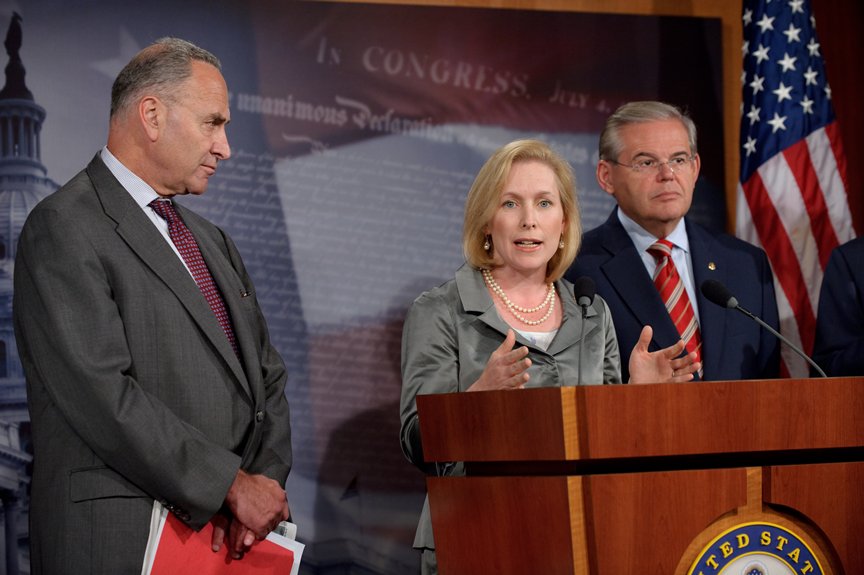
©
Now that the midterms have passed (read: What Is At Stake In The 2018 Midterms? and The Gubernatorial Races in Georgia and Florida) and given Democrats reasons to hope to get back the presidency in 2020, their eyes turn to who could take on Donald Trump. Kirsten Gillibrand, Senator of New York, might just be this person, argues William McComish.
She is even “the perfect picture of a progressive Democratic politician”, he says, in spite of her sometimes being discredited “on the same old, tired, lizard-brained and misogynistic argument that people used against Hillary Clinton: That ambitious women are off-putting.”
In early January of 2018, an opinion published on Buzzfeed raised eyebrows. In “The Trouble with Kirsten Gillibrand” Ciro Scotti questioned whether the New York Senator “is too transparently opportunistic to be a viable candidate after the rejection of another New York politician criticized for basing her positions on supposedly canny calculations rather than on from-the-gut convictions.” Scotti’s argument is that Gillibrand’s sense of timing and her ability to turn circumstances to her advantage is a bad thing because it is too obvious. Scotti, however, fails to explain why being a good politician is bad for a politician. Moreover, because Gillibrand is a woman, blaming her for being successful smacks of misogyny. Madeleine Aggeler responded: “All politicians are opportunistic; it’s practically a job requirement. But Scotti falls back on the same old, tired, lizard-brained and misogynistic argument that people used against Hillary Clinton: That ambitious women are off-putting.”
It is beyond doubt that Senator Gillibrand is ambitious, opportunistic and cunning. In a 2013 profile of the Senator, Rebecca Traister explained that: “One of her strengths, sometimes mistaken for a hollow willingness to shape-shift, is her nose for where her constituents, and the country, are headed. Through some combination of happenstance and remarkable political instincts, she often manages to show up there early.” Traister and Scotti both believe that Gillibrand has a stronger sense of opportunity than other politicians, but they differ in their attitudes to this characteristic. In order to make a neutral evaluation of Gillibrand, it might be tempting to forget that she is a woman and to proceed in a gender-neutral manner. Such an undertaking is not only impossible but neither is it desirable, indeed since a large part of Gillibrand’s focus is driven by a concern for female welfare, being a woman is thus constitutive of her political persona. The next best option is to evaluate her in a manner that states, right off the bat, that strong women are entitled to success and high-powered careers. By getting this out of the way, we might just be able to forego tired, lizard-brained and misogynistic arguments.
In the current political climate, Kirsten Gillibrand seems like the perfect picture of a progressive Democratic politician: she is an aggressive supporter of gun control, she wants legislation in favor of DACA recipients, she has joined the movement to abolish ICE, she is at the forefront of the #MeToo movement and she supports Medicare for all. She has also proven to be a fierce resistant to President Trump’s administration and she has been consistent in holding powerful men accountable for sexual misconduct, both within her own party and the Republican party. This progressive picture is nonetheless mitigated by some positions she defended early in her career.
Flip-flopping from the House to the Senate

Before being a Senator, Gillibrand represented the state of New York’s twentieth district in the House of Representatives, from 2006 to 2009. While representing that conservative and rural area, she positioned herself as a conservative Democrat, even becoming a member of the Blue Dog Coalition1. She entered the Senate in 2009, when the governor of the state of New York picked2 her to replace Hillary Clinton, then leaving to become Obama’s Secretary of State. Her switch from the House to the Senate was accompanied by a marked shift of her positions away from the right, most notably on the issues of gun control and immigration.
Gillibrand’s shift on guns caused the fall of her NRA score3 from an A to an F. Indeed while in the House, she always voted in line with NRA positions but as soon she joined the Senate she systematically voted against them. Short of a total change of heart, such a rapid change appears calculated rather than sincere. Gillibrand explains that she changed her mind after meeting with the families of victims of gun violence in Brooklyn and hearing their stories. Despite that early flip-flop, Gillibrand has since been consistent in promoting legislation to curb gun violence. Starting in 2013, she has repeatedly introduced a bill that would make gun trafficking a federal crime. This measure has been defeated several times but she reintroduced it again in November 2017. After the high school shooting in Parkland, Florida she tweeted: “It’s not ‘too soon’ to talk about solutions to end gun violence in this country. I reject that notion. The time to talk about them is now—today, tomorrow, and every day after, until we confront this epidemic.” She does not hesitate to attack the NRA, accusing the organization of being motivated by profit rather than the protection of the Second Amendment4.
Gillibrand’s positions on immigration also shifted away from the right when she joined the Senate. While she was the representative for a largely white district, she opposed amnesty for illegal immigrants, supported the use of the police to enforce immigration laws, did not believe that illegal immigrants should be allowed to have driver’s licenses and supported English becoming the official language of the USA5. In January 2009, when her nomination to the Senate was announced, immigration advocates, Hispanic elected officials and the Spanish-speaking press expressed concern for her anti-immigrant views. Demands were made for her to change her positions on the issues of guns and immigration and that is what she did. As was the case with guns, her shift was abrupt. The conservative National Review commented: “That was quick. It took less than a week for rookie New York Senator Kirsten Gillibrand to jettison her support for immigration law enforcement under pressure from Hispanic politicians.” In February 2009, she expressed support for allowing illegal immigrants to pay lower college tuition fees and said she did not support cracking down on so-called “sanctuary cities”6 anymore. This pro-immigrant stance has not changed since; and more recently she has become a vocal supporter of the Dreamers7, voting to shutdown the federal government until legislation was passed in their favor.
Trump days: The #Resistance and #MeToo

Kirsten Gillibrand never looked back: she is now on the front line of progressive forces in the Senate. She holds the lowest “Trump score” in Congress, having voted with the president only 8% of the time ; even less than progressive Senators such as Elizabeth Warren (9.3%) and Bernie Sanders (10.7%)8.
Gillibrand has also been at the forefront of the #MeToo movement on Capitol Hill, which appeared in October 20179. She believes in listening to victims and taking them seriously, something she has put into practice. She has zero-tolerance for men accused of sexual misconduct, regardless of their political party and their level of power. In November 2017, she made headlines when she said that Bill Clinton ought to have resigned in the wake of the Monica Lewinsky scandal. This statement received a lot of attention in part because Gillibrand began her political career working on Hillary Clinton’s first Senate bid in 2000 and supported her in the 2016 presidential election calling her a friend and mentor.
Gillibrand showed the same determination regarding her colleague Democratic Senator Al Franken10, calling for him to resign after multiple accusations were made of him groping and forcibly kissing women. The first accusation was made on November 16, 2017 by radio host Leanne Tweeden. The next day, Gillibrand was quoted as saying that she believed the accuser and expected to hear more from Al Franken. By December 6, a majority of Al Franken’s Democratic colleagues in the Senate called for him to step down. Gillibrand posted a statement on: “We have to rise to the occasion, and not shrink away from it, even when it’s hard, especially when it’s hard. That is what this larger moment is about. So, I have spent a lot of time reflecting on Senator Franken’s behavior. Enough is enough.” Gillibrand’s post was followed by similar statements from 11 other female Democratic Senators.
Gillibrand’s comments on Bill Clinton and her calls for Al Franken to resign have brought accusations of betraying her political mentors (the Clintons) and a popular Senate colleague (Al Franken). Matt Lewis, a columnist for The Daily Beast expressed this view on CNN: “I think she’s the most devious and cunning politician in America today. (…) It’s a woman who took Hillary Clinton’s seat, who sucked up to the Clintons for decades and then totally turned on Bill Clinton, and Hillary by the way, when the opportunity presented itself. I have no doubt that she actually does care about this issue but I think Al Franken was pretty good friends with her at one point. Now she’s turned on him. She’s stepping on a lot of people.” There is something contradictory in Lewis’ words: he accuses Gillibrand of stabbing allies in the back while at the same time admitting that she is sincere about denouncing sexual harassment. By implying that Bill Clinton and Al Franken were betrayed, he portrays them as the victims of Gillibrand. Thus for Lewis, holding powerful men accountable for their actions is “cunning and devious”, no matter what Bill Clinton and Al Franken did and no matter that Gillibrand has been on the forefront of the fight against sexual harassment for years.
Opportunity but not opportunism
Gillibrand demonstrated her impressive ability to exploit timing and opportunity to bolster her image in the closing months of 2017. By calling out powerful Democratic men, she signaled that her denunciation of misconduct is not based on party affiliation. This held particular relevance in the political context of December 2017. The state of Alabama held a special election on December 12, between Republican Roy Moore and Democrat Doug Jones for a Senate seat11. Roy Moore was accused of inappropriate behavior with underage women in the Washington Post. Moore’s alleged actions were more serious than Franken’s, hence in arguing that her fellow Democrat’s actions disqualified him from the Senate, Gillibrand showed consistency in applying zero-tolerance: if Al Franken must resign his Senate seat for groping a woman in her sleep then Roy Moore has even less of a claim to be in the Senate after allegedly assaulting a 14-year-old girl.
Gillibrand’s careful management of the timing of her statements was also apparent in a Twitter-spat she had with Donald Trump. Her statement that Bill Clinton should have resigned following his affair with Monica Lewinski was made on November 16 and she called on Al Franken to resign on December 6. After cleaning her own partisan backyard, she attacked president Trump on December 11 on the numerous accusations of sexual misconduct made against him: “President Trump has committed assault, according to these women, and those are very credible allegations of misconduct and criminal activity, and he should be fully investigated and he should resign”. This call for Trump’s resignation brought a scathing response by the president the next day: “Lightweight Senator Kirsten Gillibrand, a total flunky for Chuck Schumer and someone who would come to my office “begging” for campaign contributions not so long ago (and would do anything for them), is now in the ring fighting against Trump. Very disloyal to Bill & Crooked-USED!”. Trump does not mention the allegations of misconduct made against him but his tweet characterizes Gillibrand in a remarkably sexist manner. The president implies that she would prostitute herself for campaign cash. It also portrays her as a flunky12 to New York’s senior Senator and current Senate Minority Leader Chuck Schumer. It finally describes her as disloyal to the Clintons. In a nutshell (or a tweet): he describes her as a lackey, a prostitute and a back-stabber. In Gillibrand’s own words, Trump’s tweet is “sexist smear” and an attempt to silence her.
Gillibrand’s statements on sexual harassment were designed both in timing and content, to portray her as standing at the forefront of the #MeToo movement. But this careful sense of timing should not obscure the fact that she has been combating sexual harassment for years. One of her biggest legislative proposals, the Military Justice Improvement Act (MJIA), which has so far failed to pass the Senate, is designed to correct the weak track record of the US military in prosecuting sexual assault of US service members. Gillibrand has introduced this bill repeatedly: in 2013, 2014 and 201613. More recently, in December 2017, she introduced a bill to combat sexual assault on Capitol Hill. This legislation would prevent any public funds being used in settling harassment disputes and would make these disputes known to the public. Her long and consistent history on this issue ought to be enough to make Gillibrand immune to accusations of shallow opportunism.
Medicare for all: check
Issues such as gun control, sexual harassment and immigration have been prominent in the news in recent months, and Gillibrand has positioned herself aggressively on each of them in a manner that should appeal to progressive voters. She is on the progressive side of healthcare as well: indeed she supports a single-payer system14. Single-payer is a proposal that goes beyond the Affordable Care Act (Obamacare) because it would give the government a much more prominent role in health insurance. The champion of this issue is Bernie Sanders; Single Payer was one of the most important policy differences between the Vermont Senator and Clinton in the 2016 primaries and explains in part why his campaign gained so much support. He has since lead an effort to introduce a bill in the Senate in September 2017. A lesson the Democrats seem to have learned from the 2016 primaries is that their base supports such a reform to the healthcare system. In September 2017, Sander’s bill received the support of Kirsten Gillibrand, Kamala Harris and Corey Booker: all three of these senators are considered possible contenders for 2020. This approach to healthcare appears thus to be gaining support within the Democratic Party as a whole, and not just its progressive wing. In terms of optics, Gillibrand could easily be viewed as an opportunist attempting to be on the right side of the issue as we get closer to 2020. However, as Gillibrand made sure to remind everyone when she introduced the bill alongside Sanders, she has supported Medicare for all since her first race for congress in 2006. Should single-payer become a litmus test for prospective Democratic candidates in 2020, Gillibrand would pass it. This softens her image as a former conservative: indeed single-payer healthcare was by no means a mainstream idea within the Democratic Party in 200615.
A little repentance and a lot of flexibility
Gillibrand’s early positions are a weakness for liberals: being pro-gun and anti-immigrant are not something that Democratic voters take lightly in the era of recurrent mass shootings and Trump’s policy of separating the families of immigrants. But her inconvenient past is mitigated by several factors: she gave up these positions years ago and has not changed her mind since. Moreover she has become an aggressive advocate of gun control and immigration reform. On February 12, she was questioned about these early flip-flops on the TV-show “60 Minutes”: Gillibrand explained that she represented a rural district with specific interests and that she had not taken the time to understand these issues properly. These answers are disarmingly honest although somewhat incoherent: we are left in the dark as to what her primary motivation was. If she was only adapting her votes to her constituents then what role did the evolution of her personal values play? It is possible that she evolved to meet the majority view of New York State and, at the exact same time, had a change of heart when moving to the Senate. What is more plausible is that she found herself in a new context that called for a radical change of her political positions and that her values followed. Context is something Gillibrand refers to constantly: she appealed to the current #MeToo context when she declared that Bill Clinton ought to have stepped down for sexual misconduct: “things have changed today”. She also declared: “enough is enough” when calling for Al Franken to resign and again when attacking the NRA following the Parkland shooting. Likewise when she calls for abolishing ICE because it has become a deportation force. Gillibrand actively portrays herself as capable of identifying the right moment to evolve to a new position; she accepts that change is an integral part of politics and society. This makes her a multifaceted and flexible politician who appeals to values but does so in a very pragmatic manner with regards to context and timing.
“But Al Franken…”
It remains to be seen whether Kirsten Gillibrand’s image as a progressive will convince Democratic electors; just as it remains to be seen whether she can defeat the notion that a woman who acts against powerful men such as Al Franken, Bill Clinton or Donald Trump ought to be punished for her actions. This latter narrative seems to have gained currency; indeed George Soros recently declared that he could not support Gillibrand because he thinks her actions against Al Franken were designed “to improve her chances” in 2020. Will “But Al Franken…” become the new “But her emails…”? We will have to wait until the next presidential campaign to know for sure. Currently, Gillibrand has just won re-election to her Senate seat and has not yet announced whether she will be running for the presidency in 2020. If she does decide to run for the presidency and if she demonstrates the same sense of opportunity for leading on issues that matter to voters, she could turn out to be a very difficult candidate to defeat. Gillibrand’s talent as a politician might thus spell trouble for other candidates rather than herself.
1 Blue Dog Democrats are a group of relatively conservative democrats. They have 17 or 18 representatives in the House, depending on where you look on their website.
2 If a Senator leaves the Senate during her tenure, the governor of her home state usually nominates a replacement to either finish her term or until a special election can be held.
3 The National Rifle Association, a gun rights organization, gives elected officials scores according to their positions on gun legislation.
4 The Second Amendment to the Constitution of the United States enshrines the right to keep and bear arms.
5 Surprisingly, the US Constitution does not mention an official language for the USA.
6 Sanctuary cities are municipalities that refuse to cooperate with federal immigration enforcement (such as the U.S. Immigration and Customs Enforcement, ICE)
7 The Dreamers are people who were brought into the US when they were minors, they are undocumented immigrants, there are about 700’000 Dreamers in the USA.
8 As of July 18, 2018
9 The #MeToo movement started when the New York Times published an article alleging decades of sexual harassment of women by film producer Harvey Weinstein on October 5th 2017.
10 A Democrat from Minnesota elected in 2008.
11 Doug Jones won
12 Servant, lackey
13 It failed the two first times and failed to get a vote the third.
14 “Medicare for All” is also called a “Single Payer” system. Single payer because a unique public agency would replace the multiple for-profit private insurance companies in covering basic health insurance.
15 It is debatable whether it is even a mainstream idea in today’s Democratic party, but it has made a lot of progress.




Laisser un commentaire
Soyez le premier à laisser un commentaire